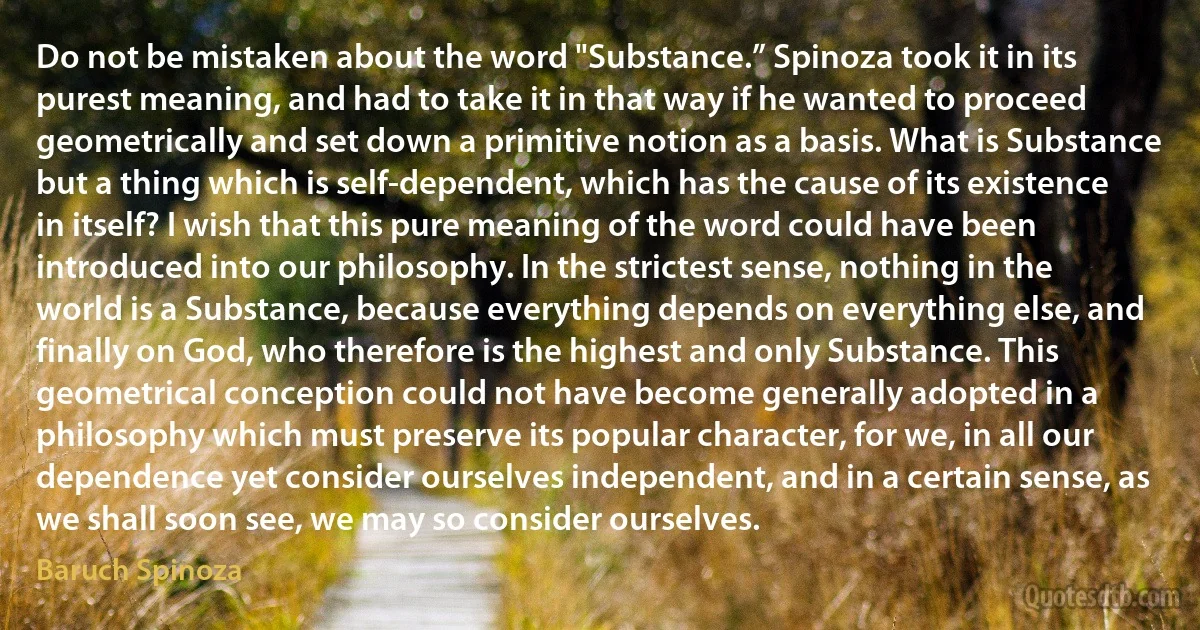
Do not be mistaken about the word "Substance.” Spinoza took it in its purest meaning, and had to take it in that way if he wanted to proceed geometrically and set down a primitive notion as a basis. What is Substance but a thing which is self-dependent, which has the cause of its existence in itself? I wish that this pure meaning of the word could have been introduced into our philosophy. In the strictest sense, nothing in the world is a Substance, because everything depends on everything else, and finally on God, who therefore is the highest and only Substance. This geometrical conception could not have become generally adopted in a philosophy which must preserve its popular character, for we, in all our dependence yet consider ourselves independent, and in a certain sense, as we shall soon see, we may so consider ourselves.
Baruch SpinozaRelated topics
cause certain character conception everything meaning mistake nothing preserve primitive proceed pure see sense set take thing way wish word world yetRelated quotes
I remember well a junior seminar I gave with Paul Tillich shortly before the outbreak of the Third Reich. A participant spoke out against the idea of the meaning of existence. She said life did not seem very meaningful to her and she didn't know whether it had a meaning. The very voluble Nazi contingent became very excited by this and scraped the floor noisily with their feet. Now, I do not wish to maintain that this Nazi foot-shuffling proves or refutes anything in particular, but I do find it highly significant. I would say it is a touchstone for the relation of thinking to freedom. It raises the question whether thought can bear the idea that a given reality is meaningless and that mind is unable to orientate itself; or whether the intellect has become so enfeebled that it finds itself paralysed by the idea that all is not well with the world.

Theodor Adorno
Thus we must carefully distinguish between two kinds of reality, one which has an individual character, and one which has a universal appearance... It is, however, wrong to think that the non-figurative artist finds impressions and emotions received from the outside useless, and regards it even as necessary to fight against them... It is equally wrong to think that the non-figurative artist creates through 'the pure intention of his mechanical process', that he makes 'calculated abstractions' and that he wish to 'suppress sentiment not only in himself but in the spectator'... It is thus clear that he has not become a mechanic, but that the progress of science, of technique, of machinery, of life as a whole, has only made him into a living machine, capable of realizing in a pure manner the essence of art.

Piet Mondrian
My work is more varied than at any other point in my life. I am still carrying out research in pure mathematics. And I am working on an idea that I had several years ago on negative dimensions. ... Negative dimensions are a way of measuring how empty something is. In mathematics, only one set is called empty. It contains nothing whatsoever. But I argued that some sets are emptier than others in a certain useful way. It is an idea that almost everyone greets with great suspicion, thinking I've gone soft in the brain in my old age. Then I explain it and people realise it is obvious. Now I'm developing the idea fully with a colleague. I have high hopes that once we write it down properly and give a few lectures about it at suitable places that negative dimensions will become standard in mathematics.

Benoît Mandelbrot
The fundamental principle of the atheism of Spinoza is the doctrine of the simplicity of the universe, and the unity of that substance, in which he supposes both thought and matter to inhere. There is only one substance, says he, in the world; and that substance is perfectly simple and indivisible, and exists every where, without any local presence. Whatever we discover externally by sensation; whatever we feel internally by reflection; all these are nothing but modifications of that one, simple, and necessarily existent being, and are not possest of any separate or distinct existence. Every passion of the soul; every configuration of matter, however different and various, inhere in the same substance, and preserve in themselves their characters of distinction, without communicating them to that subject, in which they inhere.

Baruch Spinoza
In all my works.... I have always had recourse to one never-varying method. It consists in making the delineation of the objects represented heavily dependent on a system of necessities which itself looks strange. These necessities are sometimes due to the inappropriate and awkward character of the material used, sometimes to some strange obsessive notion [frequently changed for another]. In a word, it is always a matter of giving the person who is looking at the picture a startling impression that a weird logic has directed the painting of it, a logic to which the delineation of every object is subjected, is even sacrificed, in such a peremptory way that, curiously enough, it forces the most unexpected solutions, and, in spite of the obstacles it creates, brings out the desired figuration.

Jean Dubuffet
